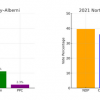Dear Senator Sanders:
We are writing to ask that you consider addressing the broken US approach to foreign policy in the Middle East, and particularly Israel-Palestine.
As a diverse group of individual American citizens living both within and outside the United States, we represent no one but ourselves, but together we represent many years of experience living, working and/or studying in the Middle East region. Our political perspectives are markedly different and our backgrounds equally diverse, but we agree on one thing: We strongly believe that in addition to economic and social issues, our US political establishment needs to be challenged on the critical issue of our nation’s relationship with Israelis and Palestinians.
Given the daily coverage of atrocities (committed by governments and insurgent forces alike) in Iraq, Syria, Libya, the Arabian Peninsula, and Egypt, it almost goes without saying that US Middle Eastern policy is in crisis. We strongly believe, as did the bipartisan Baker-Hamilton Commission (aka Iraq Study Group) back in 1996, that a large part of this crisis is a broken policy in Israel-Palestine.
We note that the Obama administration is finally being more forthright in criticism of the Israeli government, which has systematically undermined current formulas for peace through continued colonization of land in the West Bank (including East Jerusalem), restrictions on movement and entry for Palestinians specifically in the West Bank and Gaza, excessive use of military force and economic siege in the West Bank and Gaza, killing thousands and sowing despair for hundreds of thousands more. Further, the Netanyahu government is actively working to curtail voices of opposition in Israel.
But there is every reason to believe that the Netanyahu administration sees these condemnations as no more that the words of a lame duck and counts on waiting out the administration confident that neither Presidential candidates nor a new administration would dare criticize, much less take action to penalize such action. Indeed, Congress has done its best to show unconditional support for the government of Israel, and to date no Presidential candidate has voiced anything but support for the current government of Israel. And yet, there is evidence that a silent majority of Democrats in the US find Israel’s actions troubling, and we know that progressive forces inside Israel would welcome a critical discourse.
You have shown willingness to forthrightly voice support for economic justice. We believe that you could be at the forefront of articulating a more sane US policy in this region going forward – and in so doing change the political discourse so that we can forthrightly criticize all actors in the region that impinge on the legitimate rights and aspirations of people, and support those who articulate a vision of peace and justice. We noted that you were the only Presidential candidate from either party to acknowledge that Israel had used a disproportionate response in summer of 2014. But we are calling on you to go further.
In particular, we ask that you:
a) Assert the need for clear statements and actions that legitimize Palestinian civil and political rights;
b) Reiterate that we are not dealing here with equal parties. There is a power differential and Israel has a disproportionate amount of the power. Israel is the party that could take actions that would lead to a just peace;
c) Encourage actions that enhance the civic, political, and economic rights of all people in Israel/Palestine to live secure, productive, and fulfilling lives, and criticize actions that curtail these aspirations. This means recognizing that Israel (and the US as Israel’s too often uncritical supporter) has created conditions that have led to the despair and hopelessness among Palestinian youth (which is widely associated with the tragic upsurge in violence). While US politicians have condemned the violent actions of Hamas and other armed groups, it must also be acknowledged that for decades, Israel has jeopardized hopes for a just peace through the economic siege of Palestinian communities, excessive use of violence, the expansion of settlement colonies, and expanding discrimination against Palestinians inside Israel (perhaps most glaringly, but by no means exclusively under a decade of Netanyahu leadership). The US must also accept blame for failing to use its substantial influence to curtail these deleterious actions and should move toward systematically supporting international humanitarian law.
d) Recognize a Palestinian state, thus legitimizing the Palestinian Authority. (For a more thorough articulation see: http://bit.ly/President-Obama-recognize-Palestine-now-theHill and http://bit.ly/obama-two-state )
e) Recognize that a new process (no longer constrained by the parameters of the current Oslo formulation) is needed that will lead to full civil and political rights for Palestinians as well as a just resolution for Palestinian refugees.
The status quo in US policy cannot continue. It undermines US legitimacy in the Middle East and the world and serves as an ongoing destabilizing force that only empowers those who would resort to violence and oppression. Our military security establishment has stated that the Palestinian-Israeli conflict (and the widely acknowledged role of the US as Israel’s uncritical protector) continues to provide a rallying point for extremists in the Middle East region, putting US soldiers at higher risk.
Through taking these steps, you could absolutely change the discourse in the US and in so doing create a real opportunity for a just peace in Israel-Palestine and beyond.
We thank you for your attention.
Sincerely, the undersigned,
Stephen P. Gasteyer, Michigan
Sharon Lapp, Pennsylvania
Catherine M. Grosso, Michigan
Sam Bahour, Ohio
Leila Atshan, Massachusetts
Adla Aranki, Massachusetts
Mary Mckone, Maine
Fateh Azzam, Maine
Randa Shaath
Nancy Lapp, Pennsylvania
Patrice Wynne, California
Judith Berlowitz, California
Joel Beinin, California
Silas Oliveira, Minnesota
Frank Panzarella, Connecticut
Helena Simas, California
Adam Streeter, California
Hania Aswad, Texas
Richard Panzarella, California
Rafaella Lima, California
Ann Sandin,California
Miriam Beinin, California
Daniel Lapp, Pennsylvania
Richard White, California
Kathleen Kenny, California
David Bracker, California
Sawsan Hanna, Virginia
Keegan Farley, Maryland
John Benvenuto, Ohio
Ann Butler, New York
Nadia Nashid, Connecticut
Tia Andrawis, Connecticut
Karmen Fox, Maryland
Danika Jensen, California
Ziad Foty, Washington DC
Ellen Fleischmann, Ohio
Genevieve Miranda, California















